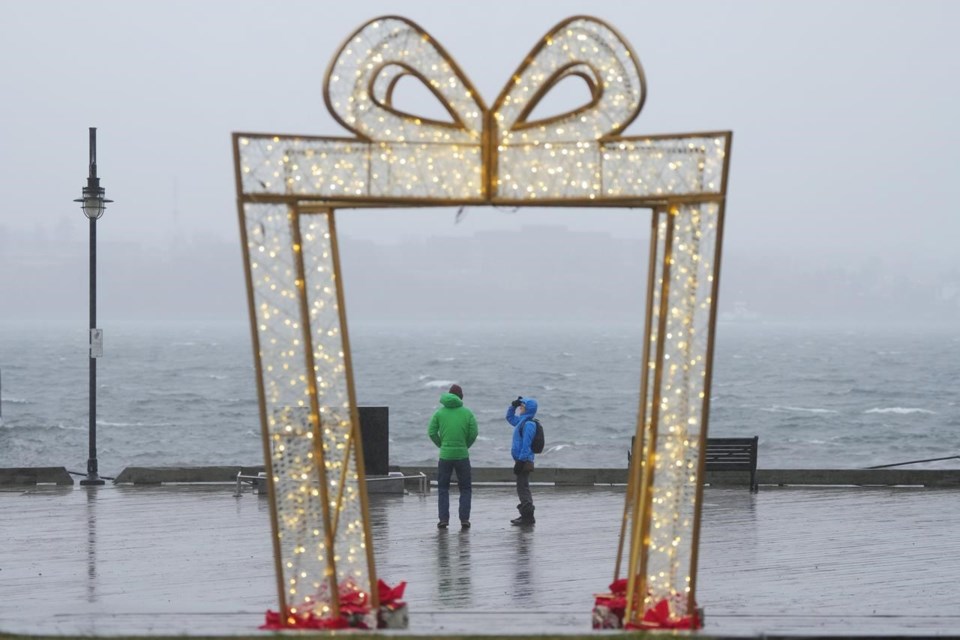HALIFAX — The weather system that hammered Central Canada on Friday also brought Christmas travel woes to the East Coast, as holiday plans were delayed by flight and ferry cancellations.
Environment Canada forecasted rain and powerful gusts through to Christmas Eve in the Maritimes, and it said the storm would carry on into Newfoundland and Labrador until Saturday night.
Forecaster Ian Hubbard said the gusts predicted were noteworthy, with expectations they would reach velocities of 90 kilometres per hour in some areas of Atlantic Canada, including up to 100 km/h in coastal areas.
Electrical utilities warned residents to prepare for potential power outages, and airline departure boards at the Halifax airport were indicating delays and cancellations of some flights, particularly those headed west.
Meanwhile, the Marine Atlantic ferry Blue Puttees experienced mechanical problems affecting its bow thrusters as it attempted to dock in Port aux Basques, N.L., on Friday morning, and due to the rough seas had to return to North Sydney, N.S., where it was expected to arrive back at 3:30 p.m.
Spokesman Darrell Mercer said the return to North Sydney meant the 446 passengers wouldn't be able to travel to Newfoundland until late Saturday night because ferry crossings scheduled for late Friday and early Saturday out of North Sydney had been cancelled because of the stormy weather.
"They'll be rebooked until Saturday night's crossings, but we know there's a significant inconvenience to that as they (passengers) had travel plans to be home for the holiday season," Mercer said.
Mercer said the Blue Puttees couldn't dock in Port aux Basques because without the bow thrusters working, the vessel wouldn't have been able to make a safe turn around Vardys Island, which sits in the middle of the harbour.
Rainfall and snow levels predicted varied around the region, with 25 to 40 millimetres of rain anticipated in southern New Brunswick and Nova Scotia, and about 20 mm in Prince Edward Island, while in northern New Brunswick the precipitation was predicted to start as snowfall.
Special weather statements were also in effect for parts of the Bay of Chaleur and south-facing shorelines of the Atlantic coast for possible storm surges.
The storm is part of the same system that hit most of Eastern Canada and the northeastern United States Friday.
Sean Borden, the Nova Scotia Power executive overseeing the utility's response to the storm, said in a release on Thursday evening that repair crews have been positioned around the province. "Based on the current forecast, we expect this storm to cause power outages across the province. We are taking every precaution to ensure we are ready to respond," he said.
One of the consequences of the wet weather is that much of the Maritimes — with the exception of northern New Brunswick — will have a snowless Christmas. The lack of snow on the East Coast at Christmas has been a trend described by Environment Canada on its website, in its analysis of 67 years of weather records for centres across Canada.
The department calculates that the probability of having a white, snow-covered Christmas Day in the Atlantic region has been falling steadily, when the period from 1960 to 1984 is compared to the period between 1997-2021.
Charlottetown has a 40 per cent lower probability of snow than it did between 1960 to 1984, while in Halifax it is 32 per cent lower and in Fredericton it is 44 per cent lower.
Mike De Wolf, a cross-country ski enthusiast, said he now has to regularly drive 530 kilometres to the north, from Halifax to Charlo, N.B., to enjoy his sport at this time of year. On Friday, he had just returned to a snowless Halifax from his latest trip to the region's last remaining snow belt.
The 73-year-old said, "there will be no skiing on mainland Nova Scotia … because of global warming." He said the decline in snowfall in Nova Scotia "is very disappointing" for outdoor enthusiasts.
This report by The Canadian Press was first published Dec. 23, 2022.
Michael Tutton, The Canadian Press
Note to readers: This is a corrected story. An earlier version had 466 passengers on board the Blue Puttees ferry, rather than 446.



